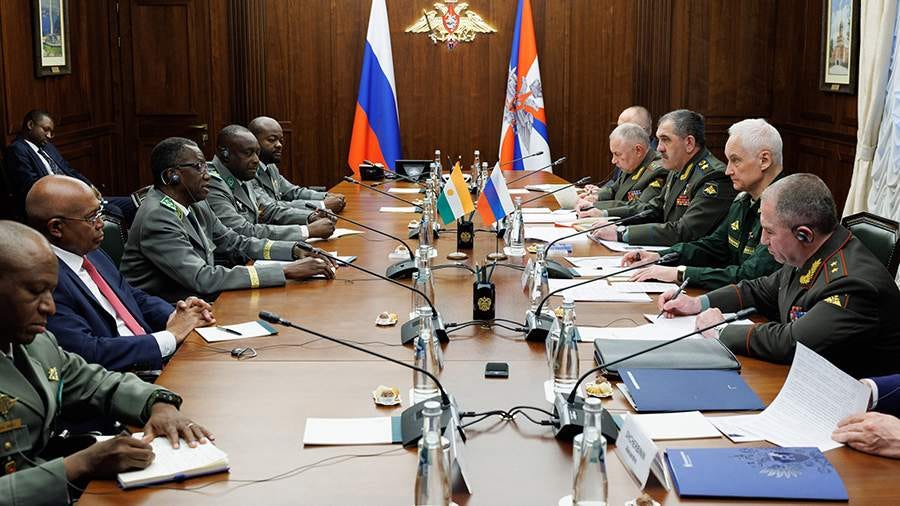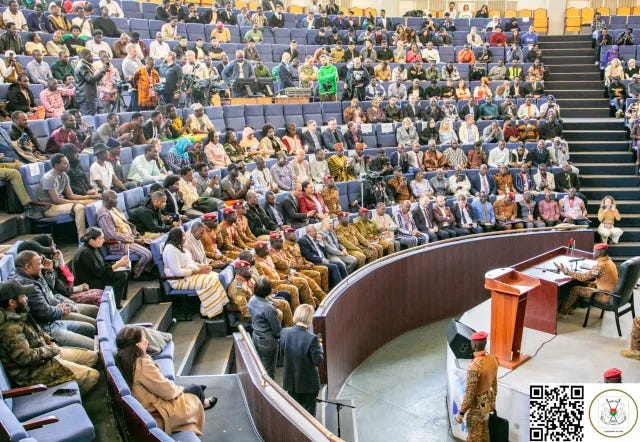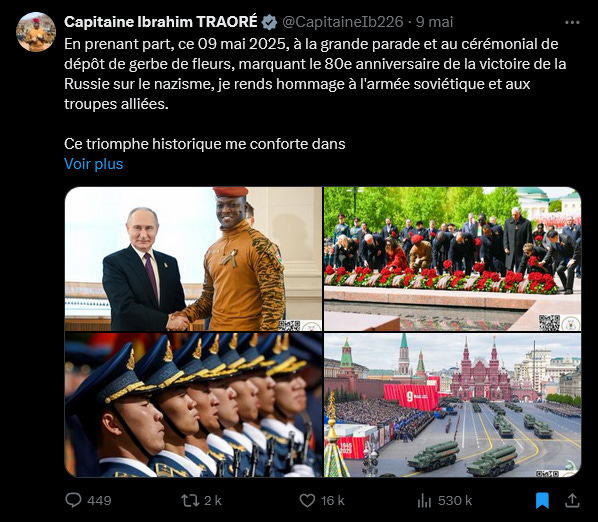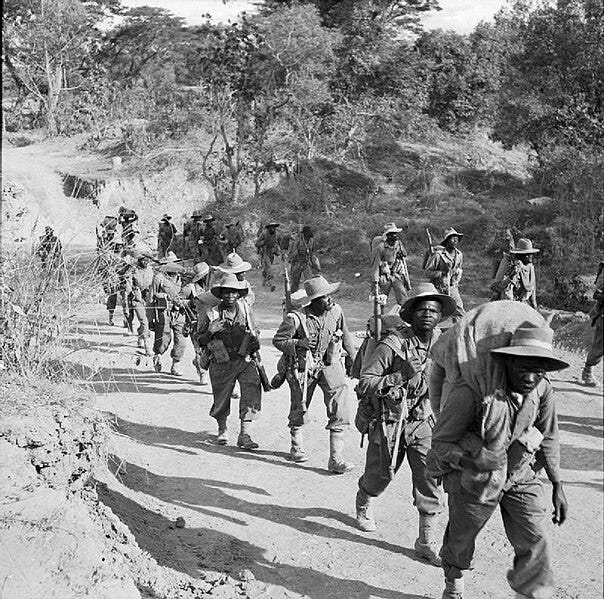The Week’s Top Five Links
“Moscow finetunes its diplomatic strategy in the Sahel”, African Intelligence, 7 May 2025 [registration needed].
Etienne Girard, “From the KGB to Putin, the connections between Russian and Algerian spies”, L’Express, 7 May 2025 [paywall, in French].
Baran, S. (2025), “BRICS Expansion: Emerging of New Semi-Peripheries or Sub-Imperialism? A Comparative Analysis of Ethiopia, Nigeria and South Africa”, Journal of Asian and African Studies, 8 May 2025 [open access].
Jeanne Le Bihan, “End of the Second World War Celebrations: Who Are Putin’s African Guests?”, Jeune Afrique, 8 May 2025 [paywall, in French].
Jibrin Ibrahim, “Ibrahim Traoré: Has Africa found a new progressive hero?”, Premium Times, Nigeria, 9 May 2025 [op-ed].
Cover photo: Russia routinely uses children for war propaganda as it serves the dual purpose of laundering its aggressive foreign policy and indoctrinating the next generation into violent militarism. The photo is of one of the many 9 May events that the Russian embassies held across Africa, this time, in Mali, and, again, using children as props (source).
The Week in Analysis
Niger intelligence. On 4 May, the security consultancy and media Zagazola published a report claiming that Niamey cut its intelligence ties with Russia and Turkey. According to the report, the junta cut off links in intelligence sharing with Ankara and Moscow because of their shortcomings in telephone call interceptions. The article then goes on to describe the many challenges faced by the junta, especially from inside rebellion. Moreover, Zagazola claims that the junta has come to rely on human sources (i.e., guys in patrol) to compensate for the lack of technical sources, especially to protect sensitive assets in Niamey. Since the publication of the story, it has been picked up by LSi Africa, Military Africa, and the AFRICOM publication African Defense Forum.
I cannot independently confirm or debunk this story, but, for me, it does not pass the sniff test. The key reason is that the intelligence services of the central Sahel states have been historically weak and tended to rely on foreign patrons. This was the case while France was around in the area and has been so since Russia’s arrival. As Zagazola does indeed mention, kicking Russia and Turkey out would cut off essentially all technical intelligence for the junta, leaving them with no drone, satellite, internet-based capabilities, or any other ones. Based on this, the junta cannot afford to be picky when it comes to foreign patronage. Another detail, too, is that military patrols in Niamey would not be surprising in the context of the seriously deteriorated security situation in the country.
‘Your guys are great but your phone tapping sucks!’ (image source: Russian MoD).
In intelligence sharing, the information flow goes both ways; Niger gains new capabilities, and Russia gains the assurance that its capabilities are not used by the West. So, cutting Russia off in intelligence sharing would threaten military cooperation with Moscow. And yet, on 10 May, the Nigerien and Russian ministers of defence met to discuss military cooperation. Since Niger’s main intelligence agency (the DGDSE) is a military organisation, the discussions pressumably touched on the role of the agencies. In any case, more details are needed to believe the original, 4 May report on a Niger-Russia (and Turkey) break in intelligence cooperation.
Detail: on 8 May, the Niger junta signed a security cooperation agreement with Iran.
9 May parade. Under the cover of a drone-proof ceiling, Russian President Vladimir Putin presided over this year’s Victory Day parade in Moscow. Since Russia’s full-scale invasion of Ukraine, the Moscow parade has lost much of its international attention, with fewer and fewer heads of state attending, not to associate themselves with a dictatorship waging a war against Europe. Being the 80th anniversary, this year was different, with more anti-drone protection and a few more guests. The event featured CCP Chairman Xi Jinping and several African heads of state, including those of Congo, Equatorial Guinea, Ethiopia, Guinea-Bissau, and Zimbabwe, plus ministers and officials from several other countries, including the DRC. None of the African heads of state sat close to Putin during the parade.
These gatherings are less about the war of the past and more about the one that, today, Russia wages against Ukraine.
The diplomatic visits led to a flurry of bilateral meetings between Russian officials and foreign guests. While Putin held meetings with the heads of states, the Russian Minister of Defence (whose armed forces committed over 150 000 war crimes in Ukraine), Andrey Belousov, met with his counterparts of Burkina Faso, Congo, Mali, Niger, and Nigeria. All meetings included Deputy Minister of Defence Yunus-Bek Yevkurov, the officer in charge of top-level management of Africa Corps. In addition, Yevkurov met representatives from the armed forces of Algeria, Equatorial Guinea and South Africa. Libya’s Khalifa Haftar also visited Moscow and met with Putin and Belousov, but no additional details have been released about their exchanges.
The junta leader of Burkina Faso, Ibrahim Traoré was also among the attendees. He flew to Moscow in a Russian aeroplane sent by the Kremlin. Traore’s Russian séjour was busy, including a meeting with Putin, to whom he reiterated the need for arms deliveries to Burkina Faso as well as ‘education’ and ‘science’ cooperation. During the parade and in the celebration dinner, Traore sat next to the Bissauan President Umaro Sissoco Embaló, for whom Putin waded into Bissauan politics (RAM no. 17). In addition, Traore met with Venezuela’s Nicolas Maduro. Traoré also visited the Russian state-owned Meldeleev Institute, holding a large meeting with students.
Traore at the Mendeleev University meeting with the ‘AES community’ (source).
On the day of the main event, the official Twitter/X page of Traoré published one post (in English and French) to mark the Moscow visit. The choice of images is intriguing: Putin, laying of flowers, PLA soldiers and air defence forces. One could write a short essay about this choice of images, but the key message is that Traoré is fully on for the ‘multipolar’ world.
S-400 please? (source)
Why so many guests from Africa? Over a million soldiers from Africa fought on the side of the Allies, recruited from the colonial empires of the time. Ethiopia, which was never colonised, also fought on the side of the Allies. This massive contribution has received recognition from the European Allies, including war pensions for veterans from the colonial empires and symbolic gestures, including medals and monuments. The VE Day parades in London and Paris featured forces from all over the African continent, with the Cameroon flag flying as one of the Allies during the Paris VE Day parade. While all good, this recognition is not at the scale of the sacrifice, especially considering the ambiguity created by the colonial context of the time, with the Thiaroye massacre of 1944 casting a dark shadow over the topic. The Kremlin is attempting to exploit this gap. In the case of the 9 May event, the narrative is that Putin, by inviting several African heads of state, is recognising the contribution of African soldiers in liberating Europe during the Second World War. This manichean view of the war and the memory of it fits in the broader patterns of the Kremlin’s narrative that the West is attempting to deprive Russia from ‘its’ victory over Nazi Germany. Here, the African participation in the war is only another prop for Russia’s distortion of history.
Go deeper: to learn more about the mistreatment of African recruits in the Second World War, and the struggles of veterans, read this Deutsche Welle report from 2015.
Troops of the 11th East African Division on the road to Kalewa, Burma (source).
War propaganda, as usual. Russian embassies all over the world carried out 9 May events, inviting other members of the diplomatic corps, as well as friendly personalities in each country. These gatherings are less about the war of the past and more about the one that, today, Russia wages against Ukraine. A clear example came from the Russian media African Initiative. Indeed, on the day, the organisation held an event at its office for African students to speak with a Russian historian about the Second World War. As usual, these seemingly innocent events include malicious war propaganda. The ‘historian’ invited was Vladimir Simindey, who routinely spreads malicious disinformation about the Baltic states, for which Latvia made him persona non grata in 2012. There is more. According to Africa Initiative, the meeting included the participation of a Russian soldier who participated in the war of aggression against Ukraine. He reportedly told the students about his everyday service, but then also included his ‘personal reflections’ about how the Second World War compares to the ‘conflict in Ukraine’. What the soldier told the students cannot be considered other than the Kremlin’s wartime propaganda.
Thank you for reading the Russia-Africa Monitor! Please leave a comment with your thoughts about the week’s stories.





